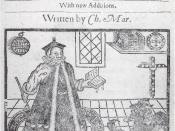Free-Will and Repentance in Dr. Faustus In Christopher Marlowe'sThe Tragical History of Dr. Faustus, the theme of free-will is manifested throughout the play but the necessity of repentance is not actually demonstrated. Dr. Faustus was a scholar like no other in his time, but he felt that the knowledge of Human scholarship - whether Philosophy (Aristotle), Medicine (Galen), Law (Justinian), or Theology (Jerome /Hieronymus) was not enough to satisfy the thirst of knowledge of the great figure of learning. Only Necromancy - black magic - offers new knowledge, the attraction of the unknown. His free-willed actions led him to live a life that many envied, but to die a death without repentance that none desired.
Even though Marlowe is more concerned with theology, the question of determinism, than that of free will, he still puts Dr. Faustus in a situation where he makes his own rules. The problem that this play confronts is this: If you believe in an all-powerful, all-knowing God, how can you accept the existence of evil in the world, which this God has created? Does this mean that God is responsible for Faustus' damnation? God does not appear in Dr.
Faustus. Instead, Marlowe clearly sets out the steps - following the theology of his age by which Faustus' fate is determined by his own actions and words. Henceforth Dr. Faustus' life was filled with comfort and luxury, but marked by excess and perversion. Everything was within his grasp: elegant clothing, fine wines, sumptuous food, beautiful women--even Helen of Troy and the concubines from the Turkish sultan's harem. He became the most famous astrologer in the land, for his horoscopes never failed. No longer limited by earthly constraints, he traveled from the depths of hell to the most distant stars. He amazed his students and...


